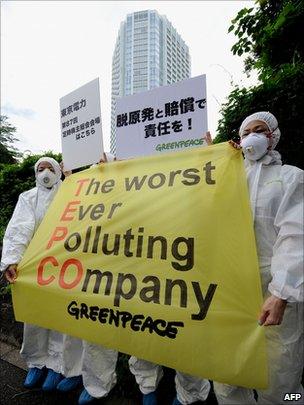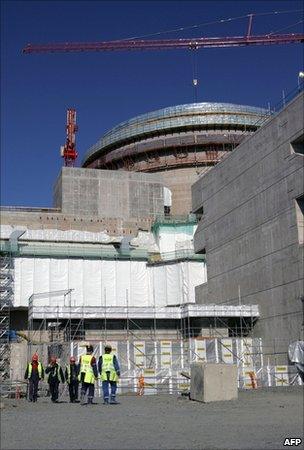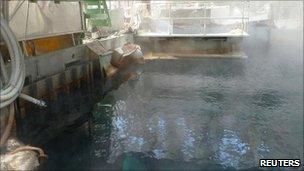Nuclear: A tortuous timescale
- Published
- comments

Tepco has suffered reputational as well as financial damage from Fukushima
While making a radio programme this week about the history of nuclear power in the light of the Fukushima disaster - more on that when it comes to broadcast - I was struck anew by a thought I've often had about the technology.
That thought is that the timescales involved in nuclear energy projects present problems that no country has come close to solving.
Consider this scenario.
A company wants to build a gas-fired power station.
They'll need financial projections stretching forward perhaps four decades, perhaps five.
Securing planning consent will take a few years, construction a few more. Most of the station's overall cost comes from buying the gas to operate it - and if the price fluctuates wildly, operators can adjust how much they charge the public in order to compensate.
Meanwhile, so many of the things are being built that issues such as cost overruns and supply chains are probably not going to be issues.
At the end of it, there's nothing to be done except a short process of decommissioning the facility - or perhaps setting up a replacement.
And there's no major safety risk; very little, in fact, that could ever put the government in the position of having to take over the operation along with its liabilities.
Nuclear power faces a very different set of issues.
In order to encompass everything, from design to long-term waste disposal, the timelines need to approach a century, if not more - and that's not taking into account events that may transpire much further in the future if something goes awry in the disposal site.
Future gazing
The UK had the world's first commercial-scale power station at Calder Hall - its other purpose was to make plutonium for weapons, but let's leave that aside for a moment.
Calder Hall opened in 1956; but there's no chance of waste resulting from its very first watts of electricity being buried before 2040 at the very earliest, external.
Some of its fellow Magnox power stations, meanwhile, will not be fully decomissioned until a century from now, external - 150 years after they were conceived.
The same is broadly true of France, Germany, Japan, the US - just about every country that has entered the nuclear arena in a big way.
Many countries' nuclear programmes started off as state-run enterprises, largely because of the military link.
The rhetoric now is that things have changed - we're talking about purely commercial ventures, with reactors manufactured, sold and bought by commercial companies, with those same entities carrying all of the financial costs.

The new reactor at Olkiluoto in Finland is way behind schedule and over budget
At a meeting I went to a couple of weeks ago, a group of long-time anti-nuclear speakers gave a very different picture.
Every nuclear power programme, they suggested, entailed in practice a big transfer of liability from the private to public sector.
That's partly because every accident or spillage has to be cleaned up; and for the few really big ones, only public coffers are big enough.
Accidents as big as Fukushima are, fortunately, very rare.
But even without them, the risk that liabilities will fall on the public purse is higher than for other energy technologies, simply because of the timescale.
The biggest element of a nuclear station's cost is construction.
And as events at Olkiluoto in Finland show once again, external, initial cost estimates have often proved too low; perhaps that will always be the case unless and until companies are putting them up by the dozen.
The second-biggest cost, meanwhile, is decommissioning and waste disposal; and here, the sums are difficult, partly because the processes will take place many decades in the future, and partly because experience of waste disposal is still scanty.
In the UK now, companies wanting involvement in the new reactor business include EdF, RWE and E.on. Currently, all are healthy and reputable.
But in half a century's time, when the reactors need shutting down and decommissioning, when there's no more cash coming in from selling electricity and only costs of disposal to look forward to, will those same companies still exist?
Will they have merged, or been taken over by corporations with different interests, or gone bankrupt? Such things have happened before, certainly in the UK's history... and the public, in those instances, has ended up paying the bill.
Yet, a number of countries are pushing ahead with new nuclear reactors; that is the reality. So how can it be done with maximum fairness to future generations?
Cradle to grave
In the Bulletin of the Atomic Scientists, external this week, Allison Macfarlane, associate professor of environmental science and policy at George Mason University near Washington DC, argues that the only fair and reasonable approach is "cradle to grave" planning, external - where all the costs and liabilities are taken into account up front, and where a disposal system for waste exists before the first concrete is poured.
A contributory factor in Fukushima, she points out, was that ponds were stashed beyond intended levels with spent fuel rods, because of delays in Japan's plans for re-processing.

Overloading of spent fuel ponds contributed to the carnage of Fukushima
As she also flags up, no cradle-to-grave systems exist anywhere in the world.
Some countries do have some ingredients in place.
Finland, for example, puts a levy on nuclear electricity, which feeds into a fund designed to be big enough to cover waste disposal at the end of the power station's life.
Finland may also win the race to open the world's first storage site for spent fuel rods, as current plans call for the Onkalo facility to accept its first consignments around 2020.
But if the geology proves unsuitable, that won't happen, entailing extra costs from the need to investigate an alternative site and to keep the rods stored above ground for longer than planned.
And there must be a chance that any serious accident at the nuclear power station nearby would shift the currently favourable opinion of local citizens - perhaps, again, entailing a move to a new site.
In either case, the money accumulating in the fund would be unlikely to cover the extra costs; once again, the public purse would shoulder the extra liability.
Arguably, nuclear reactor programmes are so big and important that governments can't leave them entirely to the private sector even if they wanted them to.
Documents obtained by The Guardian newspaper under Freedom of Information laws suggest that the UK government, external, for example, sought to launch a joint public relations offensive with the nuclear industry even as the first days of Fukushima were unfolding, without waiting for any analysis of the consequences to emerge.
It's easy to understand why none of the nuclear pioneers began with a cradle-to-grave philosophy; how could they have done, when the priority was to get reactors up and running as quickly as possible for strategic reasons?
Back in those days, tobacco companies didn't have to compensate smokers for lung cancer either; in both cases, ignorance was at a partially plausible defence.
It isn't now; which is why Professor Macfarlane ends her piece by arguing for nothing less than a root-and-branch reform of the way nuclear projects are conceived and implemented.
"After weathering the Fukushima accident, and given the current constraints on carbon dioxide emissions and potential for growth of nuclear power, redefinition of a successful nuclear power program is now required," she writes.
"It is no longer simply the safe production of electricity but also the safe, secure, and sustainable lifecycle of nuclear power, from the mining of uranium ores to the disposal of spent nuclear fuel.
"If this cannot be achieved and is not thought out from the beginning, then the public in many countries will reject nuclear as an energy choice."